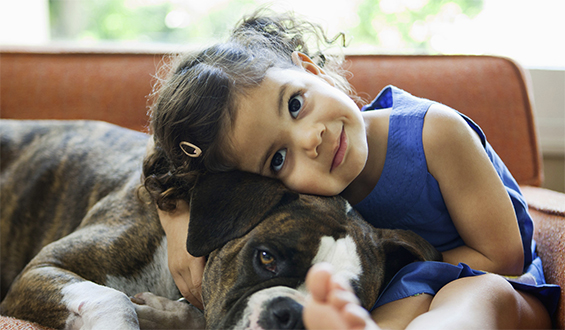
If you love dogs, you’ll probably already appreciate how much dogs contribute to the happiness of a family. Now, a recent study has found that children’s anxiety levels can be diminished by having the companionship of a dog.
Researchers observed 650 children one-and-a-half years or older and examined them for symptoms of anxiety. Of the 650 children, 58% had a dog in their home. The research team was part of Bassett Medical Center in Cooperstown, New York.
The research showed that kids who have dogs had visible signs of lowered anxiety, especially as it concerned separation and social anxiety, and they are able to initiate conversations with new people in their lives. Despite evident facts supporting this thesis in the study, a cause-and-effect link could not be proven.
“Interacting with a friendly dog also reduces cortisol levels, most likely through oxytocin release, which lessens physiologic responses to stress,” the researchers said adding, “These hormonal effects may underlie the observed emotional and behavioral benefits of animal-assisted therapy and pet dogs.”
The study was published in the journal Preventive Chronic Disease on Nov. 25. Dr. Anne Gadomski and her team carried out their study over 18 months on children with an average age of 7 who came to a pediatric primary care facility in New York for their annual consultation, writes the Agence France-Presse (AFP).
The research team used DartScreen, an online questionnaire used to find facts concerning the child’s physical activity, behavior, food, anxiety, emotional difficulties, concentration, and parent’s levels of depression. The question “Do you have a dog at home?” was also included.
The scientists found that the anxiety score was higher for girls, but the BMI, level of physical activity, and screen time between children who did not have a dog and those who didn’t was not different. The bonding and social interaction that occurs between the child and his dog strengthens the levels of oxytocin (the hormone that is partly responsible for the mother-child bond) and reduces levels of cortisol (the hormone that controls metabolism).
This process that reduces the stress response. In the US, childhood mental illness, behavioral problems, and obesity are increasing public health difficulties. At this time, one in eight children suffers from anxiety. Research has shown that having a dog is also associated with the reduction of obesity and asthma, and having a dog is said to have a positive impact on kids with cancer by stabilizing the heart rate.
Jaylaxmi Trivedi of HealthAim says it is natural to feel anxious when facing an exam or speaking in front of an audience. But when a child is worried or uneasy when confronting everyday activities, it can affect the child’s health. Such disorders are psychological conditions that necessitate psychiatric attention. If it is not treated, the condition can follow the child into adulthood.
In general, reports Kristina Marusic for MTV News, all pet owners are less likely to suffer from stress, anxiety, and depression than are non-pet owners. The researchers noted that pet therapy can improve a large number of mental health conditions, including obsessive-compulsive disorder, anxiety, mood disorders, panic attacks, post-traumatic stress disorder, and others.




